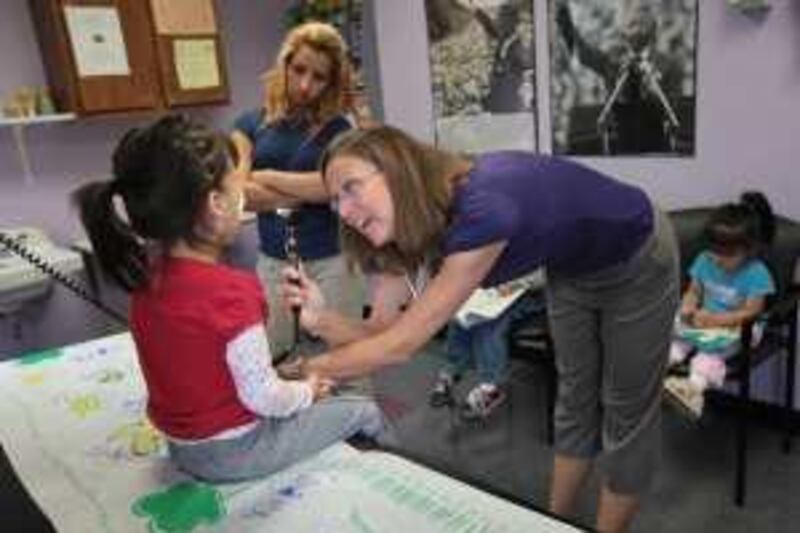AURORA, COLORADO // Staff at the Rocky Mountain Youth Clinic have hung a large world map in the hallway, with drawing pins indicating the diverse origins of their clientele, many of whom are immigrants from Mexico, the Caribbean and South America, as well as Africa, the Middle East and across Asia. As parents register their children with the front desk, some are nervous to admit that they are not in the US legally. "A lot of the people who come here are undocumented and we have a sliding fee scale depending on what they can afford," said Jill Friedentag Fishman, the clinic's spokeswoman. "We are OK with that. We just want to take care of people." The clinic is a rare refuge in a country where health care costs are spiralling out of control. It is hard for new immigrants to the US - and nearly impossible for those here illegally - to get health insurance and affordable care. As President Barack Obama pushes to reform the country's healthcare system, the question of what to do about the bulging immigrant population remains one of the thorniest aspects of a complex and controversial issue. According to the 2006 census, there are 37.5 million legal immigrants in the country and by most estimates another 11.5m who are undocumented. Together they make up more than 15 per cent of the nation's workforce, but they are less likely to be insured than any other segment of the population. About half of non-citizens lack insurance, compared with 15 per cent of US citizens. "There is quite a bias against immigrants and a general impression that they are always out for freebies," said Larry Wolk, the executive director of the Rocky Mountain Clinic. "But my experience is that they want to pay their fair share and they care about their families. The practical challenge is that they don't get regular care and they tend to end up in emergency rooms." Part of the problem is the bureaucracy: the paperwork is complex, especially for non-English speakers, and with many of the state-subsidised programmes, one has to requalify every month. In addition, many immigrant families are a mix of legal and illegal residents. Undocumented parents whose children were born in the US, often fear alerting authorities to their presence by registering their American-born children for Medicaid, a public insurance system for low-income families. In many cases, older children are also illegal, meaning the family suffers from splintered care. "For us the situation is a nightmare," said Marta, an undocumented immigrant from Mexico who was at the Rocky Mountain clinic for a check-up for her two-month-old girl. Her three children qualify for Medicaid - although, ironically, that has only happened since her husband lost his job as a landscaper - but she and her husband must pay for their health care out of their own pocket. "I have tried to buy insurance and they ask me, 'Are you a citizen or a resident?'" she said. "I say, 'Neither one', and they tell me, 'Well, we can't help you then'." Since a routine visit to the doctor can cost upwards of US$200 (Dh735), many undocumented adults end up putting off check-ups and they often do not get treatment when they become sick in the hope they will get better on their own. Those who do not recover sometimes end up in hospital emergency rooms, facing far more costly care, which many do not pay. "The sad reality is that people will end up in an ER because they don't have money for a clinic," said Dr Lillian Diab, a Syrian doctor working at the Rocky Mountain clinic who moved to the US 17 years ago. "They end up costing the system more since they can't get low-cost treatment. It hurts me to see it." Although it is hard to calculate total costs to the system, experts say it is a key factor contributing to the nation's rising healthcare fees. Mr Obama has pledged that children will receive universal coverage under his new health plan regardless of their status. But the issue of providing care to undocumented adults is fraught with complexity - and as a political issue it is practically radioactive in Washington. The irony is that the vast majority of the country's migrants are young and healthy, meaning that if they could buy into a public health insurance system, they would represent a relatively low-risk population for insurers. As it is, many young, healthy Americans forgo insurance, gambling that they will not get sick, meaning insurance costs are higher in part because there is a higher proportion of sick and elderly people in the system. Advocates of a national healthcare system - like those in place in Canada and Europe - argue that making low-cost health insurance available to all would encourage preventive health and reduce costs down the line. "We all pay one way or another," said Mr Wolk. "The question is do you want to pay on the front end or back end." gpeters@thenational.ae
The maze that is health care in the US
President Obama's plans to reform the health system include care for all children. How their parents will fare is a far more complex issue.

Editor's picks
More from the national





